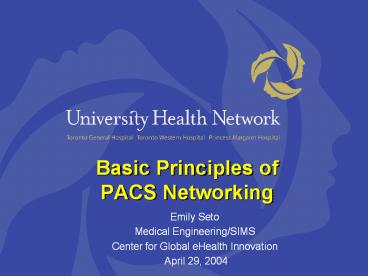Basic Principles of PACS Networking PowerPoint PPT Presentation
1 / 20
Title: Basic Principles of PACS Networking
1
Basic Principles of PACS Networking
- Emily Seto
- Medical Engineering/SIMS
- Center for Global eHealth Innovation
- April 29, 2004
2
Overview
- PACS Introduction
- PACS Network Related Concepts
- Network Lingo and Relevance to PACS
- Example of PACS Network
- Take Home Message
3
What is PACS?
PACS Picture Archiving Communications System
System facilitating viewing storage of digital
medical images
4
Medical Digital Images
X-RAY BASED
Mammography
Nuclear Med (PET)
Light
CR
Fluoroscopy
5
PACS
Acquisition
Processing
Storage
Viewing
HIS
RIS
6
PACS Network Related Concepts
7
Reliability/Security
- Mirrored systems separated by physical distance
- Archived data
- Redundant paths (consider direct path from
acquisition device to particular PACS PC) - 24/7 Support (access network remotely)
- Secure lines outside of hospital to view images
- eg via Virtual Private Network from physicians
homes
8
Speed
- Online, Near-line Disaster Recovery Back-ups
- Prefetching autorouting (pushing images)
- Local copy vs streaming data
- Bandwidth (dedicated LAN)
9
Compression
- Lossy vs non-lossy (up to 31)
- Acceptable compression different for each type of
image - Different types (eg wavelet, jpeg)
318 kB
101 (30 kB)
1001 (4 kB)
10
Network Lingo and Relevance to PACS
11
Local Area Network (LAN)
- Computer network that spans relatively small area
- Can be desirable to have dedicated PACS LAN for
all PACS devices (acquisition devices, display
workstations, storage, and servers) - Advantages
- Helps ensure adequate bandwidth
- Can aide in device management
12
Redundant Array of Independent (or Inexpensive)
Disks (RAID)
- Combination of multiple disks drives to improve
- Performance
- Data striping (spread out blocks of each file
across multiple disks) - Fault tolerance
- Disk mirroring
- Dedicated disk for error correction
- 50 of hardware device failures are due to disk
failures
13
Network Attached Storage (NAS)
- Storage device taken away from server and
directly connected to network - Devices assigned IP addresses and accessed by
clients via a server (gateway to data) or
accessed directly by clients
14
NAS Advantages
- Centralized storage, security, management, and
data back-up - Servers running different operating systems can
all access data - Expandability (add new device without shutting
down servers) - Fault tolerance (server fails can still access
data)
15
Storage Area Network (SAN)
- High-speed sub-network of shared storage devices
- Access data via server systems connected to both
the LAN and SAN
16
SAN Advantages
- Centralized storage, modular scalability, high
availability, and increased fault tolerance - Removes bandwidth bottlenecks with LAN based
server storage - Serverless backup (high speed data backup without
using LAN bandwidth)
17
Example of NAS/SAN
Image Acquisition Devices
Non-compressed Deep Archive
1
Load-Weighted Servers
Tier 1 Storage -redundant paths out -connected
by fiber optic cables -most recent
studies -non-lossy compression
2
3
Tier 2 Storage -compressed (lossy) -older studies
4 (2 months later)
Image Display
NB Entire system should be mirrored offsite
18
Networking Budget
- Mirrored servers storage (several Terabytes)
- Archiving (magneto-optical tapes, DVD-ROMs,
CD-ROMs, etc.) - Petabyte (1024 Terabytes)
- Proper facilities to house servers storage
- Network infrastructure (network drops, cable,
etc) - Support
19
Take Home Message
- Each institution will have their own PACS
networking needs depending on size, type and
volume of images, existing network, and budget
available - Main concepts to keep in mind
- Reliability/Security
- Speed
- Compression
20
?
Contact Info Emily Seto
emily.seto_at_uhn.on.ca (416)340-4800 x6409

